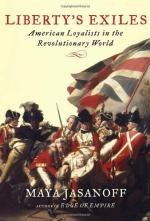|
This section contains 1,762 words (approx. 6 pages at 300 words per page) |

|
An examination of loyalists of the American Revolution opens up an elusive world of changing terms and historical interpretations. Technically all American colonists were "loyal" until the Declaration of Independence in 1776 forced them to take sides publicly. But in the preceding decade, as resistance to Parliament and its policies escalated, the question facing Americans was whether their acknowledged grievances justified riots, boycotts, armed protests, and, ultimately, revolution. Those who maintained the faith that the British government would rectify colonial complaints through the legal legislative system were contemptuously dubbed "Tories" by their more aggressive "Whig" opponents—terms drawn from seventeenth-century English politics. After 1776, "Tory" and the somewhat more dignified label, "Loyalist," became synonymous.
Loyalists and Historians
As the "losers" in the Revolution, loyalists did not fare well in revolutionary-era histories. Although comprising half a million of British America's white population of 2.5 million, they became a topic of objective historical...
|
This section contains 1,762 words (approx. 6 pages at 300 words per page) |

|


